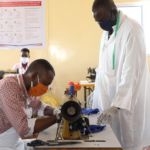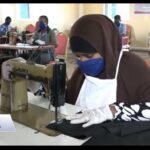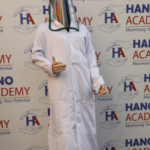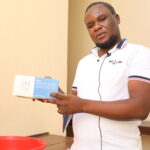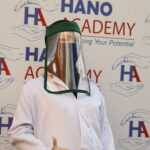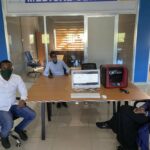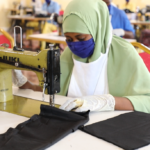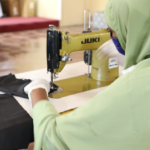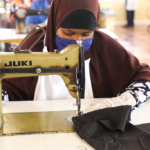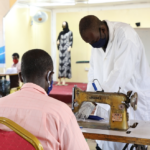Innovative Solution for Face Masks against COVID-19 in Somalia
As nations fight to stop the spread of COVID-19, many suggestions have been proposed as to how this war can be won. COVID-19 is dangerous because it can be easily spread to many people within a short time. Of great concern is that a majority of people are asymptomatic and so continue spreading it to others unknowingly. The suggested measures include washing hands regularly, using sanitisers, practising social distancing, avoiding crowded places and wearing face masks. The same rules have been proposed all over the world, including in Somalia. Hand washing, combined with social distancing and proper use of face masks, helps to slow the spread of COVID-19 in the community1 . Face masks reduce the transferability of germs from the wearer to others by blocking large droplets when people sneeze or cough. People should use these masks to realise their usefulness in the fight against this scourge. It is however advisable to always practise social distancing, avoid touching the face and maintain good hygiene practices. This article will concentrate on the role played by Hano Academy in Somalia to fight the spread of the virus through the production of face masks. The masks are readily available and very affordable to all Somalis. The academy is currently calling upon other players, including the International Community and the private and public sector, to team up in the production and distribution of these masks to everyone in Somalia.
Although many people don’t understand the importance of wearing masks, studies indicate that increased mask use by the public is an essential way of stopping the spread of coronavirus. Masks are known to protect people from the virus, especially in higher intensity transmission environments such as the general community. Currently, many states have made the wearing of face masks in public a must. They help mainly in circumstances where many people interact, such as stores, public transport and other forms of public gatherings. The inconsistency in offering guidance by governments has been confusing, especially amid a pandemic. It has led to an increase in the number of citizens in developed countries such as the US wearing masks. Although the same has been the case in Somalia, only a few people have taken up the practice. The majority of Somalis aren’t convinced that coronavirus exists in the country and as such haven’t taken the initiative of wearing face masks. Additionally, the majority of Somalis, especially in the rural and peri-urban areas, can’t afford to purchase the N95 medical face masks, thereby predisposing themselves to the virus
1) Strategies for stopping the spread of corona virus in the community
Some experts suggest that areas in Asia such as Hong Kong and South Korea managed to control the spread of the virus because the majority of citizens of these countries started wearing face masks sufficiently early. It’s paramount that medical personnel, vulnerable populations such as the refugee returnees and IDPs, and those who are already infected use personal protective equipment (PPE) such as masks. This explains why Hano Academy is offering an alternative that could reduce the strain on the available N95 medical grade masks. Coronavirus particles are extremely tiny to be trapped by most fabrics that still allow air to flow through them. However, the virus seems to be most transmissible when it adheres to much larger water or mucus droplets expelled from our mouths and noses when we cough, sneeze or talk, and a homemade mask can block those droplets2 . It should also be noted that most countries have banned exportation of face masks because of the continuous spread of the virus. Masks available in these countries aren’t even sufficient for their populations and as such can’t be exported. This leaves most African countries such as Somalia in a precarious position. Masks made by Hano Academy are a local solution for Somalia. Idea Generation Dr Sadiyo Siad3 , who is a specialist in infectious diseases and immunology, developed this innovative idea that not only adds value but makes the masks more efficacious. She conducted research on how to create something that could make the masks better than other homemade face masks. This led her to devise a filter which is inserted in the masks. The filter traps all dirt, germs and viruses from the external environment, therefore protecting the wearer. Furthermore, the filter traps saliva droplets from the mouth of the wearer, which reduces person-to person transmission of the virus. The same idea has been adopted by the University of Leicester (where Dr Sadiyo Siad is an alumni) where they are using the filter to detect the virus rather than just trap it. According to the university, the masks will make it easier to test and diagnose patients without necessarily doing nasal swabs4 . The ideas for making masks arose as a result of the global efforts to stop or reduce the spread of coronavirus. The Hano Academy team under the leadership of Dr Sadiyo designed the first prototype, which was later improved to make the final product that’s readily available for all Somalis.
2) Relevance of the sawn Face Masks
3)The Brainchild behind the idea – Dr Sadiyo Siad
4) Use of face masks to detect COVID-19 3
Recommended Specifications According to the Centers for Disease Control and Prevention (CDC), face masks should:
- Fit snugly but comfortably against the side of the face
- Be secured with ties or ear loops
- Include multiple layers of fabric
- Allow for breathing without restriction
- Be able to be laundered and machine dried without damage or change to SHAPE
Production
Before starting to sew, we always ensure our team members are symptom-free. The Hano Academy team members begin by washing their hands using soap as per the WHO hand-washing recommendations6 . They then sanitise their hands using sanitiser and the work area using a recommended disinfectant. They put on gloves to ensure no contact with the fabric and sewing equipment. They clear the whole workplace area to ensure there are no contaminants such as food or hair present. The equipment and materials are also disinfected thoroughly before the process starts. This is to ensure our masks are safe for use. After sewing, the completed product is further sterilised before being packaged safely for distribution.
5 CDC requirements of face masks
6 WHO recommendations on obligatory hand hygiene against transmission of COVID-19
Figure 01. Illustrations showing the Hano Academy production team making and packaging masks; they indicate the process used by the Hano Academy team to make the masks.
Equipment
The Hano Academy team use the following equipment to prepare the masks:
- Sewing machine
- Thread
- Scissors
- Safety pins
- Straight pins
- Elastic bands
- Filters
- Ironing board
Fabric
The team uses the recommended cotton fabric for making the masks. The effectiveness of a mask is measured by its ability to filter out particles and still allow for breathing. The uniqueness of the masks made by the Hano Academy team is that they all have a filter that prevents the passage of bacteria and viruses but allows the wearer to breathe comfortably
Characteristics
The mask has two layers, the inner layer that touches the face and the outer layer that’s exposed. The two layers are all from the same fabric, which is folded into two. As mentioned above, the team uses cotton fabric to allow for breathability and filtration. The masks have elastic and cotton strands for easier fitting. This is to ensure that people of different ages and sizes acquire masks that are comfortable for their use.
Ear Loop Material
The team uses elastic cords to make ear loops. Also, the masks have pleats that make it easier to cover the mouth and the nose of the wearer. The pleats run alongside the bridge of the nose and the chin, and are intended to make it easier to customise the fit. The ear loop material is always half an inch wide.
Filter
When sewing, the team leaves a pocket allowance where the filter is carefully inserted. The filter is important because it helps in minimising the spread of the germs and viruses. This is a unique aspect that makes these masks more reliable. These filters are what make our masks unique and innovative compared to other masks.
Ironing Board
Once everything has been sewn together and we have the completed masks, they are ironed to straighten the pleats and strengthen the edges.
Cleaning and Reusability
Most Somalis are financially incapable of buying many face masks. In cases where the user can’t afford a new mask regularly, it’s advisable to wash the masks and reuse them. Hano Academy uses cotton with a filter, making it easier to wash. It’s recommended that the masks must be adequately cleaned before they are reused. To wash them, they must be laundered in hot water using a detergent or soap that doesn’t leave residues. They must be rinsed thoroughly with fresh water and hung up to dry. Those who can afford can alternatively disinfect the masks by soaking them for 7 minutes in a solution of 1/3 cup of bleach per gallon of water. Those who can’t afford bleach can soak the masks in boiled salty water for about 5 to 10 minutes. Other experts argue that normal laundering of washable masks made of cloth fabric, including drying the masks on high heat, should be sufficient to remove any appreciable viral inoculation of novel coronavirus given what is known about its survivability on surfaces7.
7 Washing the masks for reuse 6
|
https://www.youtube.com/watch?v=dAk6KwEpPhQ Face Masks for Controlling the Spread of COVID 19 in Somalia Hano Academy 2020 HA2020 Coronavirus COVID-19 www.youtube.com |
Locally Made
This initiative is aimed at achieving two objectives, namely to save lives and increase job creation during this difficult time. Jobs range from those involved in production to those in marketing and distribution. One of Hano Academy’s main objective is to offer skills training and create jobs, especially for the disadvantaged communities. The project involves Somalis and trains them to take care of each other, especially during these tough times when the pandemic is threatening to sweep the whole population away. The materials used are locally available, thus making it easy to obtain and use. The limited N95 medical grade or surgical masks can be used by medics, whereas those made by Hano Academy will be used by different people, such as civil servants, security forces, private sector employees such as bank workers, hotel and restaurant staff and the general public. The cloth face coverings recommended are not surgical masks nor N-95 respirators. Those are critical supplies that must continue to be reserved for healthcare workers and other medical first responders, as recommended by current CDC guidance8.
8 CDC recommendations on face masks
Community Social Responsibility
The continuous spread of COVID-19 is a threat to the existence of humankind. Governments around the world are coordinating efforts for minimising the fatality rates and limiting the spread of the virus. Although several experiential treatments have worked in some places, there isn’t yet a cure for the virus. The private sector, institutes of higher education and non-governmental organisations are leveraging the government’s efforts in the fight against the pandemic.
7
Hano Academy, through its Community Social responsibility programme, has devised this innovative idea to help the Federal Government of Somalia in the fight against coronavirus. The academy uses locally available material to ensure every Somali can access a face mask. The plan was to supply the masks throughout the country and even beyond if needed. Other players in the private sector, such as NGOs, universities, and even private companies, were invited to join the academy in this initiative. The academy distributed over 500,000 masks since covid started. This has succeeded with support and mutual partnership with all interested parties.
Above all, Somalis should follow the government’s directive of staying at home, washing hands, maintaining social distance, using recommended sanitisers and wearing masks. It’s only through heeding these guidelines that Somalia will win the war against coronavirus.
References
Use of Cloth Face Coverings to Help Slow the Spread of COVID-19, Centers for Disease Control and Prevention (CDC), retrieved from: https://www.cdc.gov/coronavirus/2019-ncov/prevent-getting-sick/diy-cloth-face-coverings.html
Answers to your DIY face mask questions, including what material you should use, The Washington Post, (accessed on 11.4.2020) retrieved from https://www.washingtonpost.com/health/2020/04/07/answers-your-diy-face-mask-questions-including-what-material-you-should-use/?arc404=true
Interim recommendations on obligatory hand hygiene against transmission of COVID-19, retrieved from: https://www.who.int/who-documents-detail/interim-recommendations-on-obligatory-hand-hygiene-against-transmission-of-covid-19
How to clean your face mask to help prevent getting and spreading coronavirus, retrieved from: https://www.inquirer.com/health/coronavirus/coronavirus-covid19-how-to-clean-face-masks-facemask-washing-20200407.html
COVID-19 Information and Resources – Homemade Face Masks, retrieved from: https://intermountainhealthcare.org/covid19-coronavirus/homemade-face-masks/

